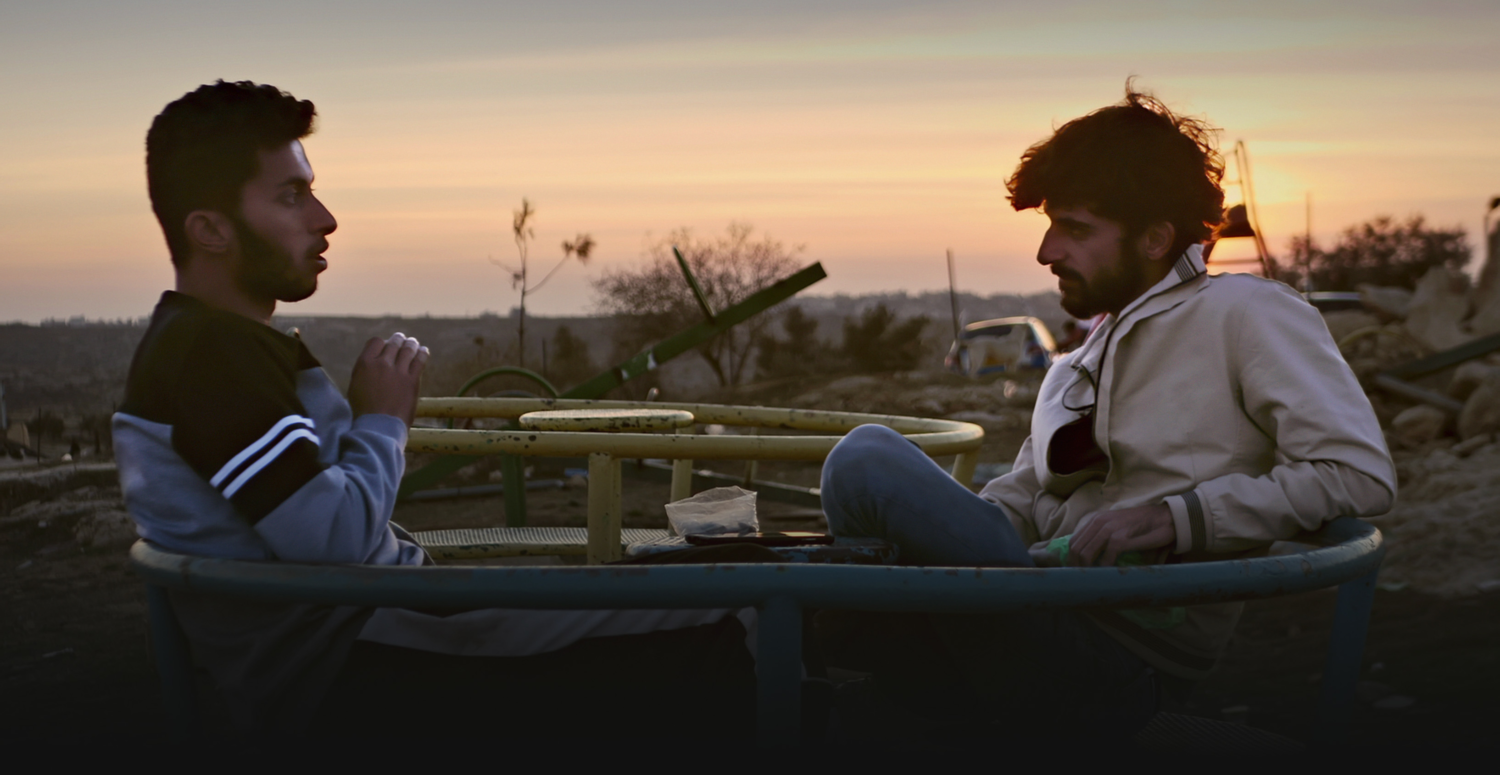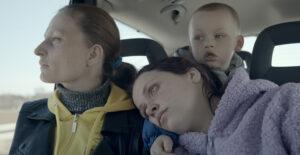No Other Land
[Docu]
Best Documentary Feature Film – Oscars
Best Documentary Film – Berlin
Best Documentary Feature – Spirit
Audience Award – Copenhagen
Audience Award – Vancouver
2024

FR EN
“Je filme tout !” tel est le cri de guerre que lance Basel aux militaires israéliens encadrant les bulldozers venus raser son village de la carte.
Pendant cinq ans, ce juriste palestinien et journaliste improvisé filme quotidiennement ces dévastations de village et déportations d’habitants qui s’accrochent aux terres qui sont les leurs depuis plusieurs générations. Israël tente en effet de chasser ‘légalement’ ces éleveurs de la vingtaine de villages que regroupe Masafer Yatta, cette région semi-désertique du sud de la Cisjordanie occupée. La population avait jusque-là réussi pendant quatre décennies à contenir l’emprise des militaires et des colons (notamment en attente d’une décision de justice israélienne), reconstruisant inlassablement leurs habitations et se réfugiant dans des habitats troglodytes de fortune. Mais la Cour Suprême israélienne a finalement tranché : Masafer Yatta sera un terrain d’entraînement militaire ! Avec Hamdan Ballal, un ami fermier, et deux Israéliens solidaires et opposés à l’occupation, Rachel Szor une cheffe-opératrice et Yuval Abraham un journaliste d’investigation, Basel documente ainsi de l’intérieur la violence de l’occupation israélienne en Cisjordanie et le cycle infernal qui s’instaure lors de la plus grande expulsion israélienne depuis 1967 …
« No Other Land » est un documentaire brut et édifiant porté par la force de ses images de terrain, dont on ressort sans voix devant l’inhumanité de notre monde. C’est un témoignage dévastateur sur le gouffre politique et moral dans lequel sombre Israël, et un témoignage courageux de deux Palestiniens et deux Israéliens qui ont uni leurs forces dans une dénonciation qui s’en voit inévitablement renforcée. Tourné entre l’été 2019 et le mois fatidique d’octobre 2023, c’est un tournage long, fastidieux et dangereux dans des conditions précaires entre urgence, colère et humour. Ces quatre jeunes cherchent à travers leur union et ce choix du long-métrage à décloisonner la circulation de leurs images et à proposer une contre-information jusque dans les médias israéliens.
Leur travail commun constitue le socle thématique d’un tel film entre amitié et solidarité comme fil rouge d’une relation de confiance qui se construit progressivement dans un pays où les citoyens sont violemment discriminés selon les couleurs. Yuval occupe ici une place particulière car sa légitimité est constamment mise à l’épreuve (par les deux camps) et puisque son amitié avec Basel constitue le symbole même d’une paix idéalement possible. Au final, la véritable leçon de paix ne se trouve pas dans le documentaire mais dans sa genèse : celle de la collaboration paisible entre deux hommes que tout divise légalement mais qui ne sont finalement pas si différents, deux hommes qui pourraient bien devenir amis alors qu’un apartheid tente inlassablement de les séparer.
Mais si les réalisateurs-résistants filment évidemment pour partager la réalité et faire prendre conscience de la catastrophe en cours, ils veulent aussi créer un savoir et une pression politique pour que cette communauté ne soit pas effacée par l’occupation. En somme, ce n’est pas un documentaire sur une résistance pacifique, c’est le documentaire lui-même de par ses images et la ténacité de ces quatre jeunes à toujours vouloir filmer et documenter la situation qui constitue en lui-même un geste de résistance. On vient armé chez eux et on leur confisque leurs outils, alors la caméra devient leur nouvelle arme et l’image un projectile qu’ils n’espèrent pas être à blanc. Le stock d’images qu’ils se sont ainsi constitués est devenu leur armurerie et leur documentaire un objet de lutte.
Raphaël Sallenave
“I’m filming it all!” is Basel’s battle cry to the Israeli soldiers supervising the bulldozers that have come to wipe his village off the map.
For five years, this Palestinian lawyer and self-made journalist has been filming the daily destruction of villages and the deportation of residents who have been clinging to their land for generations. Israel is in fact attempting to “legally” drive these farmers out of the twenty or so villages that make up Masafer Yatta, a semi-desert region in the south of the occupied West Bank. Up until then, the population had managed to hold off the military and settlers for four decades (pending an Israeli court ruling), tirelessly rebuilding their homes and taking refuge in makeshift cave dwellings. But the Israeli Supreme Court has finally ruled: Masafer Yatta will be a military training ground! Together with Hamdan Ballal, a farmer friend, and two Israelis who stand in solidarity and stand up to the occupation, Rachel Szor, a film operator, and Yuval Abraham, an investigative journalist, Basel thus provides an insider’s view of the violence of the Israeli occupation of the West Bank, and the never-ending cycle set in motion by the largest Israeli eviction since 1967…
“No Other Land” is a raw and powerful documentary, with images from the field that leave us speechless in the face of the inhumanity of our world. It is a shattering testimony to the political and moral abyss into which Israel is sinking, and a courageous testimony from two Palestinians and two Israelis who have joined forces in a condemnation that is bound to be strengthened. Shot between the summer of 2019 and the fateful month of October 2023, it’s a long, tedious and dangerous journey in precarious conditions between urgency, anger and humor. Through their union and the choice of this feature-length film, these four young people are seeking to open up the spread of their images and offer counter-information even to the Israeli media.
Their work together provides the thematic foundation for such a film, with friendship and solidarity as the guiding light for a trusting bond that gradually builds up in a country where citizens are severely discriminated on the basis of color. Yuval takes on a special role here, since his legitimacy is constantly put to the test (by both sides), and since his friendship with Basel represents the very symbol of an ideally possible peace. In the end, the real lesson for peace is not to be found in the documentary but in its making: that of the peaceful collaboration between two men who are legally divided but who are not so different after all, two men who could well become friends while an apartheid relentlessly tries to keep them apart.
But while the filmmakers/resistants obviously film to share their reality and raise awareness of the ongoing tragedy, they also want to create knowledge and political pressure to ensure that this community is not erased by the occupation. Ultimately, this is not a documentary about peaceful resistance; it’s the documentary itself, through its images and the tenacity of these four young people to always want to film and document the situation, which in itself amounts to an act of resistance. As their homes are taken with arms and their tools seized, the camera then becomes their new weapon, and the image a bullet they hope won’t come up blank. The collection of footage they have built up has therefore become their armory, and their documentary a vehicle for struggle.
Raphaël Sallenave

